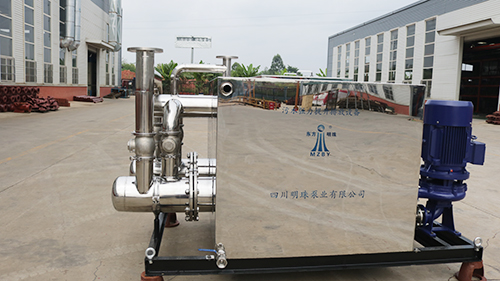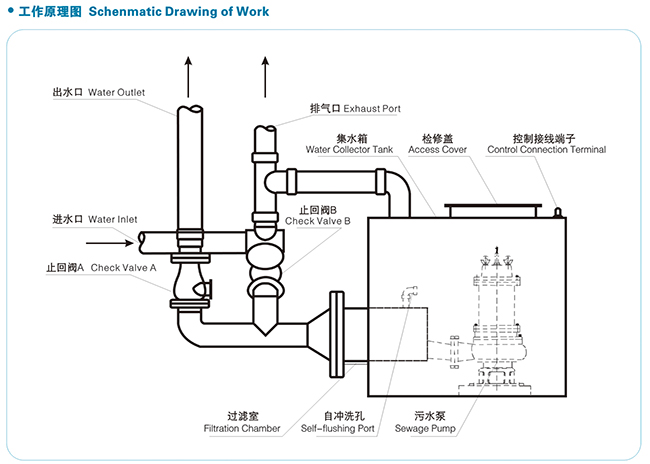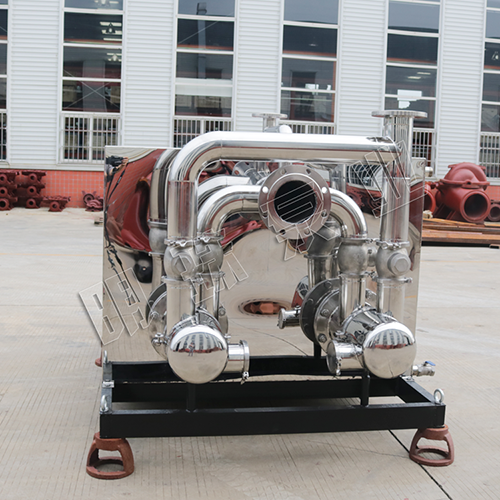Traditional domestic sewage discharge in the basement of a building. When the sewage pipe cannot be discharged into the sewage pipe by gravity, a sewage collection tank and a sewage pump should be set up and discharged to the outdoor inspection well. However, this form of sewage discharge has promises in practical applications. There are many disadvantages, such as dirt easily causing sedimentation and plugging, and manual decontamination and cleaning must be performed regularly; the sewage pump is often stuck to damage by the debris; the odor generated during the cleaning process pollutes the surrounding environment, etc., so practice has proved this This type of sewage discharge is not ideal.
◆Product Overview
Traditional domestic sewage discharge in the basement of a building. When the sewage pipe cannot be discharged into the sewage pipe by gravity, a sewage collection tank and a sewage pump should be set up and discharged to the outdoor inspection well. However, this form of sewage discharge has promises in practical applications. There are many disadvantages, such as dirt easily causing sedimentation and plugging, and manual decontamination and cleaning must be performed regularly; the sewage pump is often stuck to damage by the debris; the odor generated during the cleaning process pollutes the surrounding environment, etc., so practice has proved this This type of sewage discharge is not ideal.
The WQP type sewage powerful discharge equipment is a new generation of products independently developed by our company's technical research and development personnel based on the actual use of the site, with the core of economy, practicality, environmental protection and high efficiency. It is characterized by using the filtering function of the equipment to cleverly block the impurities and solid particles in the sewage in the impurity deposition chamber. When the water level in the collection tank reaches the set start pump level, the sewage pump starts to collect the water in the tank and the deposition chamber. The impurities in the chamber are discharged into the F water inspection well. When the water level in the collecting tank reaches the pump-stop level, the sewage pump stops and completes a sewage discharge. Every time it is discharged, the impurities in the deposition chamber are cleaned up. It avoids the deposition of debris and saves manual cleaning regularly; it also prevents impurities from passing through the sewage pump to avoid damage caused by the jam of the pump. Therefore, it has won the favor of the majority of new and old users.

◆使用(yòng)範圍及條件
1、應用(yòng)于各類建築小(xiǎo)區(qū)的生活污水排放。
2、輸送污水的溫度不超過40℃,外置式不超過80℃。
3、輸送污水的PH值在4-10範圍内。
4、污水含固大直徑不應超過排出管道通徑的80%。
◆産品特點
● 排污能(néng)力強、無培塞一一污物(wù)不經過污水泵葉輪,不會對污水泵造成培塞, 延長(cháng)了泵的使用(yòng)壽命; 而且排污直徑不受限于葉輪流道大小(xiǎo),可(kě)排污物(wù)直徑大為(wèi)排出管徑8o%。
● 環保、無污染一一污水在密封狀态下儲存及排放,不外溢、無臭味, 不會污染周邊環境; 生活排水管道上單向調有效的阻擋了臭味的回流。
● 免清掏一一污水與污物(wù)先分(fēn)離,通過反沖洗的功能(néng)一起排出, 設備每運行一次, 污物(wù)排出一次, 同時利用(yòng)自沖洗功能(néng)将水箱沖洗一次, 真正實現無沉施、免清掏, 大大減少了日常維護工作(zuò)及維護費用(yòng)。
● 提高建築物(wù)利用(yòng)率一一産品的緊湊設計不僅使得外形美觀, 而且占地面積小(xiǎo)、安(ān)裝(zhuāng)方便、節省地下室空間,大大降低運行費用(yòng)和
土建費用(yòng) 。
● 自動化控制系統一一系統能(néng)實現全自動控制, 具有手動/自動切換、 主副泵定時交替動行、 高低水位自動啓動、 各種故障報警等功
能(néng), 附合樓宇自動化設計;另可(kě)根據用(yòng)戶需求配置人機界面,可(kě)視化遠(yuǎn)程調整、 監測和維護 。
● MZPWS(B) -I-N型単泵内置式(單泵全封閉式)設備适用(yòng)于排水量均勻、瞬時排水量較小(xiǎo)的場所,适用(yòng)排放地下室同層來水, 設備安(ān)裝(zhuāng)在地坑内, 站地面積較小(xiǎo);
◆産品選用(yòng)要點
● MZPWS(B) -I-W型單泵外置式設備适用(yòng)于排水量均勻、瞬時排水量較小(xiǎo)的場所,适用(yòng)排放地下室多(duō)層,但底層無生活污水,需對上一層地下室生活污不強排的場合, 設備安(ān)裝(zhuāng)在地上室底層地面上;
● MZPWS(B) -II-N型雙泵内置式(雙泵全封閉式)設備适用(yòng)于排水量較大,排水量均勻、瞬時來水量較小(xiǎo)的場所,适用(yòng)排放地下室同層來水, 設備安(ān)裝(zhuāng)在地坑内;
● MZPWS(B) -II-W型雙泵外置式設備适用(yòng)于排水量較大,排水量均勻、瞬時來水量較小(xiǎo)的場所,适用(yòng)排放地下室多(duō)層,但底層無生活污水,需對上一層地下室生活污水強排的場合,設備安(ān)裝(zhuāng)在地下室底層地面上;
● MZPWS(B) -IV-N型四泵内置式設備适用(yòng)于排水量較大,排水量均勻、瞬時來水量較大的場所,适用(yòng)排放地下室同層來水,設備安(ān)裝(zhuāng)在地坑内, 設備工作(zuò)時可(kě)依據來水量的不同自動選擇一級泵或級号泵同時啓動;
● MZPWS(B) -IV-W型四泵外置式設備适用(yòng)于排水量較大,來水量均勻、 瞬時排水量較大的場所, 适用(yòng)排放地下室多(duō)層, 但底層無生活污水,需對上層地下室生活污水強排的場合,設備安(ān)裝(zhuāng)在地下室底層地面上, 設備工作(zuò)時可(kě)依據來水量的不同自動選擇一級泵或二級泵同時啓動。
◆工作(zuò)原理(lǐ)
含有污物(wù)的生活污水靠白身重量, 由建築生活排水管線(xiàn)進入設備進水口,當經過過施室時,污水與污物(wù)進行分(fēn)高,污物(wù)暫存于過濾室内;通過過濾的污水經水泵進口反方向流入集水箱。當集水箱的水位達到設定啓票水位時,主泵啓動(多(duō)泵設備主泵與副泵交替啓動) , 污水泵吸取集水箱内過滿後的污水利用(yòng)出口壓力反沖洗過施室, 使過港室内的污物(wù)随壓力水流一起排入室外排水檢査并, 同時自沖洗孔對集水箱進行清洗, 此時主泵端止回間B處關閉狀;态不會産生污水回流, 副泵端止回間 B為(wèi)開啓狀态生活污水繼續流入設備, 當集水箱内水位降至停泵水位,主泵停止運行,設備的一次排污過程結束。對于単泵設備運行時,污水可(kě)經過其它過旋室連續流入設備内,不受水泵運行與否的影響。











